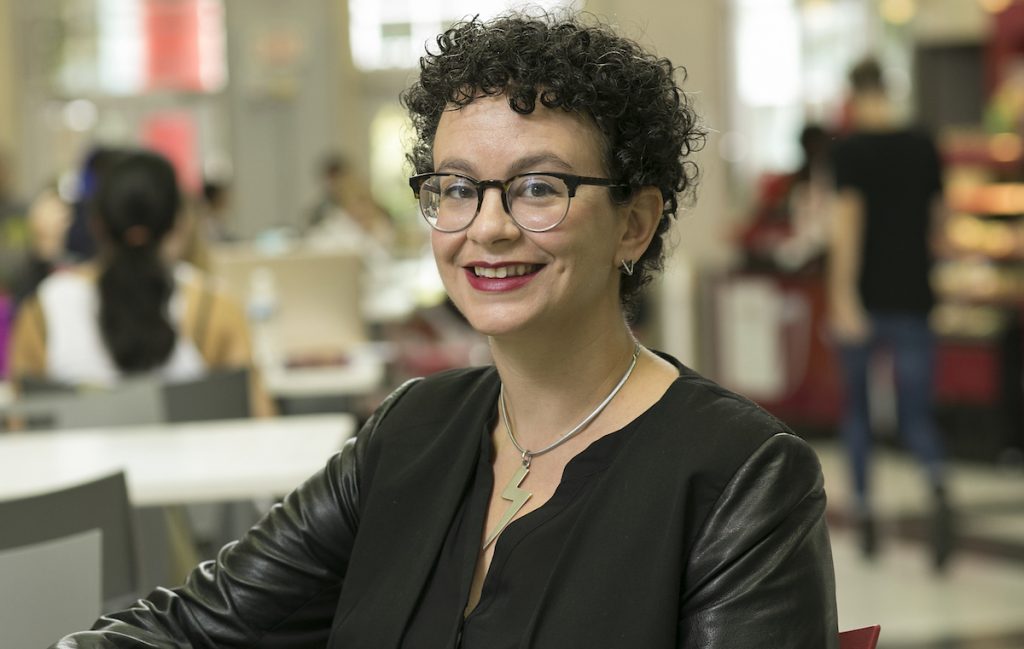On any given day, Dr. Larisa Mann might be teaching a class in the Department of Media Studies and Production, DJing a dance party in Italy, advocating for domestic workers at the Brooklyn Museum or meeting with bouncers to talk about how to reduce sexual assault in their clubs. It would be fair to expect that moving through so many roles might leave Mann’s identity a little fractured. In fact, it’s the opposite. The core values that drive her work also drive her into courtrooms and classrooms, warehouses and punk shows.
Mann’s work often brings together that which seems completely incompatible. Holding a doctorate in jurisprudence and social policy from Berkeley Law, she’s a legal scholar whose scholarship finds value in illegal gatherings. She started her research studying the clash between copyrights and Jamaican music. Since then, her work has expanded to consider the many ways that people gather and express themselves outside of the law.
In March, as part of the nightlife advocacy group 24HrPHL, Mann participated in a panel discussion about the tensions between city codes and underground music gatherings. While some panelists wondered how to pitch Philadelphia’s nightlife as worthy of government support, Mann pushed deeper, drawing on her research to remind attendees that institutionalization isn’t always right for communities.
“Among many groups that want to support cultural and community expression, there’s a push towards legalization,” Mann explained, “but legalization isn’t always liberating for people, given that many communities have cultural expressions that don’t fit very well with law.”
It’s not that Mann doesn’t believe in city oversight. She acknowledges that especially for marginalized people, like trans youth, a legal show is likely to feel much safer than a secret warehouse party. Regulations like fire codes are designed to prevent tragedies like the Ghost Ship Fire in Oakland, where 36 people were killed during an illegal party. Still, she encourages the search for a middle ground that keeps people safe without inhibiting their cultural and community practices.
“The solution can’t be to shut down every unofficial creative event that happens,” Mann said. “There [have] got to be ways to intervene and support safer cultural practices without shutting them down.” Mann draws a distinction between legalization, which requires following regulations that are often financially or socially prohibitive for artists and communities, and (preferable) decriminalization, which prevents revelers from facing legal retribution.
24HrPHL was formed to support Philly’s nightlife with both engagement and information. The group’s website helps artists who are ready to go legit learn how to do so. The group also collects data to help the city, and the community itself, understand the role that nightlife plays in Philadelphia. A survey created by 24HrPHL is the first to collect residents’ opinions on how nightlife affects them.
According to Mann, some of the most important work that 24HrPHL does connects policymakers with people who really understand the scene, like DJs, bouncers and bands. For example, the group stepped in when the city was preparing to crack down on band posters attached to telephone poles as part of an anti-waste campaign. All that the licensing office saw were pieces of paper destined to become litter on city streets.
“They didn’t recognize that there was any valid reason for people to want to put posters on a telephone pole,” said Mann. “There was no understanding of how band posters advertising shows are part of an economy that [are] not replaceable by, say, the internet.”
In conversations with the office, members of 24HrPHL pointed out that there is something necessarily tied to place about flyering. Bands learn about shows in the neighborhoods where they hang out. Putting up flyers (and taking them down) is gig work that supports the income of people in the community. Without speaking to those who relied on flyers, the city representatives could never have understood their value.
When people want to party without the police, making sure that spaces are safe falls to the participants. “A lot of what we do at 24HrPHL is internal,” said Mann. “We’re talking amongst ourselves about how to take more responsibility.” For example, the group works with Women Organized Against Rape to train bar staff, event organizers and even attendees at music events in bystander intervention to prevent sexual assault.
“Part of what I see as my goal is to share music with people, but also to try to get people a sense of that music as connected to communities,” said Mann “so that it isn’t just an aesthetic safari experience.” When DJing a show in Italy that featured African music, for example, Mann stopped her set to get on the mic and challenge her audience not to turn a deaf ear to African refugees in their country. Mann acknowledged that she has the privilege of both moving through marginalized communities and being accepted in spaces of privilege, and she said she sees that as a responsibility.
In all her work, Mann emphasizes that music has many layers. “If you are a member of a community that is targeted by the state, or targeted by other groups, like fascists, then in a way the music that is who you are is resistance music,” Mann said.
In the Trump era, Mann encourages those who would resist to consider that the music of protest isn’t limited to didactic folk songs that explicitly outline policy goals. “If your music makes other people call the cops, then it’s resistance music,” she said.
In the classroom, at City Hall and on the dance floor, Mann uses music to connect the powerful and the marginalized, the often seen and the rarely heard. “You have to understand what it is that gets people moving. You have to respect it,” she said. “Even if you don’t like it, when you see a whole bunch of people feel affirmed by something, you have to recognize it. You have to meet people where they are.”

